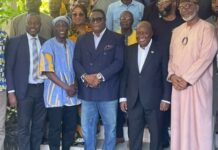President Nana Akufo-Addo has laid the foundation stone for the construction of Ghana’s first Foundry and Machine tooling centre at the Atomic Energy Commission in Accra.
The centre will be equipped with agro-processing machine and equipment, farming implements and spare parts for maintenance and repairs to provide technical support to government’s initiatives such as One-District-One Factory.

President Akufo-Addo also noted that the centre will develop and grow the talents and skills of the youth
“It is widely acknowledged that every nation that has developed acquired the capacity to design and build the basic tools and equipment needed to support their way of life and it is the obvious reason why the establishment of the founder and machine tooling centre is a timely development,” he said.
The Minister of Environment, Science and Technology, Professor Kwabena Frimpong-Boateng said the project is the beginning of the journey towards tools industrialisation in Ghana.

The Minister noted that the project is expected to be completed within a space of nine months despite being a difficult and complex journey.
“I am aware that this is the beginning of the journey towards true industrialisation of the country, there is no turning back. This is a disruptive undertaking that will change this country forever,” he said.
Also present was the Director General of the Ghana Atomic Energy Commission, Professor Benjamin J. B. Nyarko.
In his welcome address, he praised President Akufo-Addo for being the first Head of State since 1976 and the first President of the Fourth Republic to visit the Ghana Atomic Energy Commission facilities twice within two years.
He further stated that foundry technology the world over has proven to be important in developed countries and will therefore be very crucial in Ghana’s efforts to develop its manufacturing industry, and thus, expand the economy.

The manufacturing industry relies heavily on computer-numerical control machining (CNC), including operations that use engineer – operated equipment such as routers, shaping machines, vertical millers and center lathes.
CNC manufacturing process utilises computerised controls to operate and laminate machine and cutting tools to shape stock material such as metal, plastic, wood, foam, composite, into custom parts and designs.

Boundries are established to make metal castings possible as this is essential in metal working where castings are produced by pouring liquid metal into a mould, which contains a hollow cavity of the desired shape, and then allowing it to cool and solidify.
The solidified part, known as a casting, is ejected or broken out of the mould to complete the process.




![CRC engages Akufo-Addo, Bawumia and Kyei Mensah-Bonsu [Photos]](https://www.adomonline.com/wp-content/uploads/2025/06/Constitutional-Review-Committee-218x150.jpg)

